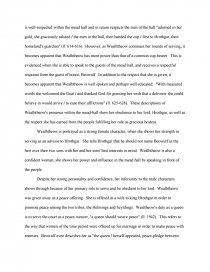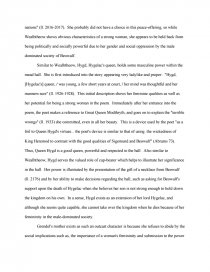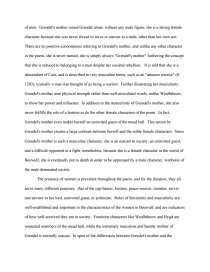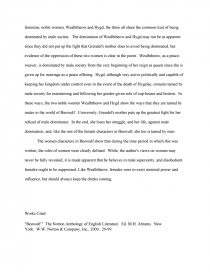Wealhtheow: The Role of Women in Beowulf
Essay by review • December 21, 2010 • Essay • 1,704 Words (7 Pages) • 4,082 Views
Wealhtheow: The Role of Women in Beowulf
Beowulf is an epic tale written over twelve hundred years ago. In the poem, several different female characters are introduced, and each woman possesses detailed and unique characteristics. The women in Beowulf are portrayed as strong individuals, each of whom has a specific role within the poem. Some women are cast as the cup-bearers and gracious hostesses of the mead halls, such as Wealhtheow and Hygd, while others, Grendel's mother, fulfill the role of a monstrous uninvited guest. The woman's role of the time period, author's attitude, and societal expectations for women are evidenced throughout the poem.
Wealhtheow is Hrothgar's queen and the mother of his two sons. Wealhtheow portrays the role of a traditional Anglo-Saxon woman at the time. When Wealhtheow is first introduced to the audience, she immediately falls into her role as peaceful greeter and cocktail waitress. The author writes, "Then Wealhtheow came forth / folk-queen of the Danes daughter of Helmingas / and Hrothgar's bedmate. She hailed all of them / spoke her peace-words stepped to the gift-throne / fetched to her king the first ale-cup" (ll. 612-6). Wealhtheow then proceeds through the meadhall "offering hall-joy to old and to young / with rich treasure-cups" (ll. 621-2). When Wealhtheow first approaches Beowulf and the Geats, she "bore him a cup / with gold-gleaming hands held it before him / graciously greeted the Geats' warleader" (ll. 623-5). The author then reinforces that she is a member of the weaker gender by directing Wealhtheow to her proper position behind the king. When the queen is not serving drinks or greeting the hall guests, she may usually be found obediently following Hrothgar throughout the mead hall and "waiting for hope-news" (ll. 923).
Wealhtheow exists as the main female protagonist in the poem. She does not enter as a character until she is needed to fulfill her role as the cup-bearer for the first feast at Heorot. She is well-respected within the mead hall and in return respects the men of the hall "adorned in her gold, she graciously saluted / the men in the hall, then handed the cup / first to Hrothgar, their homeland's guardian" (ll. 614-616). However, as Wealhtheow continues her rounds of serving, it becomes apparent that Wealhtheow has more power than that of a common cup-bearer. This is evidenced when she is able to speak to the guests of the mead hall, and receives a respectful response from the guest of honor, Beowulf. In addition to the respect that she is given, it becomes apparent that Wealhtheow is well spoken and perhaps well educated: "With measured words she welcomed the Geat / and thanked God for granting her wish that a deliverer she could believe in would arrive / to ease their afflictions" (ll. 625-628). These descriptions of Wealhtheow's presence within the mead-hall show her obedience to her lord, Hrothgar, as well as the respect she has earned from the people fulfilling her role as gracious hostess.
Wealhtheow is portrayed as a strong female character, when she shows her strength in serving as an advisor to Hrothgar. She tells Hrothgar that he should not name Beowulf as the heir over their two sons with her and her sons' best interests in mind. Wealhtheow is also a confident woman; she shows her power and influence in the mead hall by speaking in front of the people.
Despite her strong personality and confidence, her inferiority to the male characters shows through because of her primary role to serve and be obedient to her lord. Wealhtheow was given away as a peace offering. She is offered as a wife to king Hrothgar in order to promote peace among the two tribes, the Helmings and Scyldings. Wealtheow's duty as a queen is to serve the court as a peace-weaver, "a queen should weave peace" (ll. 1942). This refers to the way that women of the time period were offered up for marriage in order to make peace with enemies. Beowulf even describes her as "the queen / herself appeared, peace-pledge between nations" (ll. 2016-2017). She probably did not have a choice in this peace-offering, so while Wealhtheow shows obvious characteristics of a strong woman, she appears to be held back from being politically and socially powerful due to her gender and social oppression by the male dominated society of Beowulf.
Similar to Wealhtheow, Hygd, Hygelac's queen, holds some masculine power within the mead hall. She is first introduced into the story appearing very ladylike and proper: "Hygd, [Hygelac's] queen, / was young, a few short years at court, / her mind was thoughtful and her manners sure" (ll. 1926-1928). This initial description shows her feminine qualities as well as her potential for being a strong woman in the poem. Immediately after her entrance into the poem, the poet makes a reference to Great Queen Modthryth, and goes on to explain the "terrible wrongs" (ll. 1933) she committed, even in all her beauty. This is a device used by the poet "as a foil to Queen Hygd's virtues... the poet's device is similar to that of using the wickedness of King Heremod to contrast with the good qualities of Sigemund and Beowulf" (Abrams 73). Thus, Queen Hygd is a good queen, powerful and respected in the hall. Also similar to Wealhtheow, Hygd serves the valued role of cup-bearer which helps to illustrate her significance in the hall. Her power is illustrated by the presentation of the gift of a necklace from Beowulf (ll. 2176) and by her ability to make decisions regarding the hall, such as asking for Beowulf's support upon the death of Hygelac when she believes her son is not strong enough to hold down the kingdom on his own. In a sense, Hygd exists as an extension of her lord Hygelac, and although she seems quite capable, she cannot take over the kingdom when he dies because of her femininity in the male-dominated society.
Grendel's mother exists as such an outcast character is because she refuses to abide by
...
...




